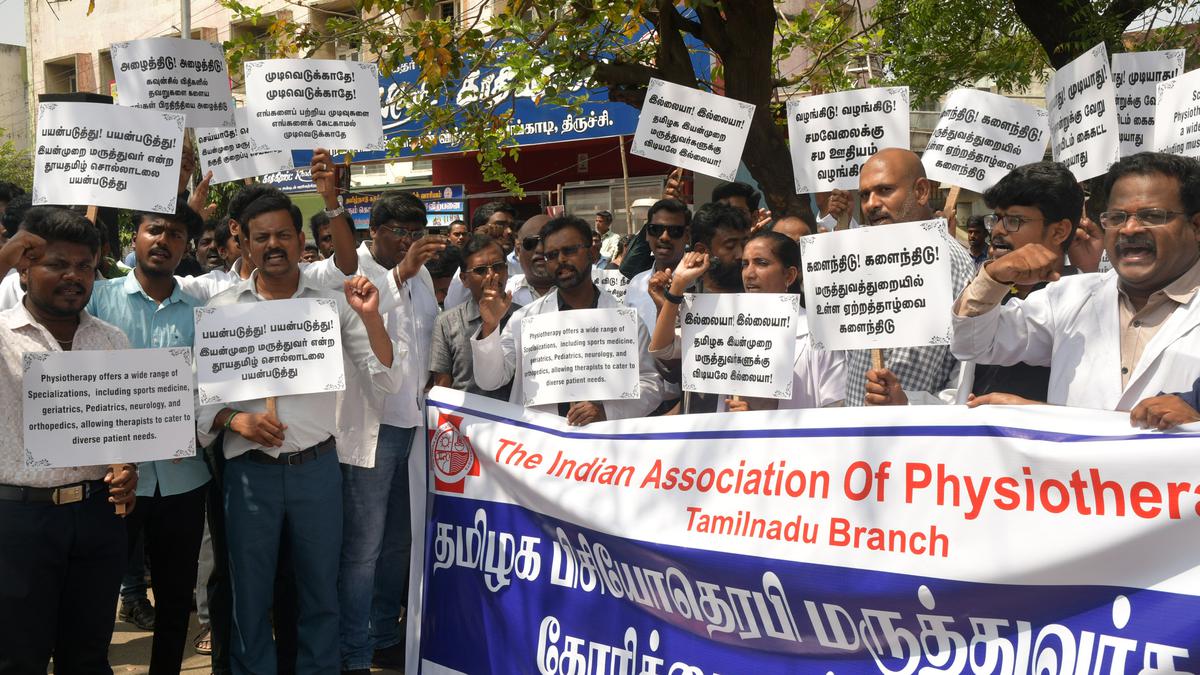
Physiotherapists protest against designation of ‘technicians’
The Hindu
Members of the Tamil Nadu branch of Indian Association of Physiotherapy (IAP) staged a protest in the city on Saturday to air their grievances about a range of issues related to official nomenclature and work conditions
Members of the Tamil Nadu branch of the Indian Association of Physiotherapy (IAP) staged a protest in the city on Saturday in support of their demands and in protest against the official nomenclature.
In a statement, association president V. Krishnakumar objected to physiotherapists being designated as “technicians” in the regulations and application form printed in the gazette of the State Allied and Healthcare Professionals Council (SAHPC) two months ago.
The SAHPCs are to be established following the passage of the National Commission of Allied and Healthcare Professionals Act in 2021 by the Centre. “In Tamil Nadu, physiotherapy has been recognised as a diploma course since the early 1970s, and as such, those qualifying in this discipline should not be classified as a ‘technician’. Its sudden use is inappropriate and should be removed from the application form. In fact, in 1971, the State government’s Tamil lexicon of official administrative titles refers to physiotherapy doctors as ‘Iyan Maruthuvar’,” said Dr. Krishnakumar.
The official said the State government departments should apply the Tamil titles Iyenmurai Maruthuvam to physiotherapy and Iyen Maruthuvar for physiotherapists. Similarly, government medical colleges should be named as Iyenmurai Maruthuva Kalloori and not Sikichai, he said.
The official body urged the authorities to specify a minimum qualification of Bachelor of Physiotherapy (BPT) in order to set up a private practice and expressed concern over the recent decision by Tamil Nadu Adi Dravidar Housing and Development Corporation (TAHDCO) to allow graduates of any discipline to establish clinics.
Protesters said the SAHPC stipulation of two credentials to register as physiotherapist, including that from an allopathy doctor with three years of experience, was not feasible for qualified candidates who may have studied in other districts and should be removed in Tamil Nadu.
“To ensure equal work and equal pay, a minimum remuneration of ₹35,000 should be set for physiotherapy doctors working in central and state government schemes,” he said in the statement. He said that alternative medical practitioners should not be allowed to use physiotherapy equipment in their treatment.

If one set their mind to understanding this Age in earnest, they would arrive at this conclusion without any anfractuous philosophical wandering. It is an Age where epithets are taken in vain, being used mindlessly. What should be reserved for the sublime is misdirected into eulogising the quotidian. And when the sublime shows up, no apt epithet is to be found, all the suitable ones having been frittered away on everyday things. Recently, while in the presence of a tree at Andhra Mahila Sabha in Adyar, this writer was acutely made aware he had squandered away a valise of epithets denoting size in all the writing he had done before. Guilty of overworking “Brobdingnagian” to a frazzle, he was tongue-tied when the truly Brobdingnagian stared at him, a massive branch wedged in its cheek in amused derision. It is a Baobab whose trunk takes multiple pairs of hands to be held in a comfortable embrace. T.D. Babu, associated with tree conservation organisation Nizhal, has had a ringside view of this tree being encircled in a human chain; and the exercise took nearly two dozen pairs of hands. This Baobab is Adansonia digitata or African Baobab. He explains: “In 2023, as a Madras Day exercise, Nizhal together with the Forest Department organised a tree walk with multiple stops. At Andhra Mahila Sabha, the participants did a succession of human chains fully encircling the tree, and it took around 20 pairs of hands to do so.” Baobabs are engineered by nature to be big hulking beings; but nurture determines the extent to which they follow that script. Babu notes the Baobab at Andhra Mahila Sabha has found a helpful environment and that has enabled it to reach its potential. He points out the tree’s age would be anywhere between 250 to 300 years. It is still in the flush of youth: a Baobab’s life expectancy is 1000 years. One need not be surprised to find Baobabs departing from planet earth prematurely. The lack of a conducive physical space can send them packing early. A Baobab at Egmore Museum left, whole centuries un-lived.

 Run 3 Space | Play Space Running Game
Run 3 Space | Play Space Running Game Traffic Jam 3D | Online Racing Game
Traffic Jam 3D | Online Racing Game Duck Hunt | Play Old Classic Game
Duck Hunt | Play Old Classic Game










